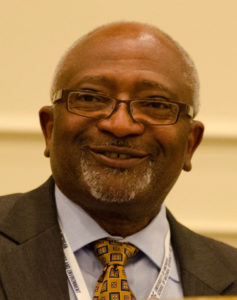Robert D. Bullard (*1946) is a sociologist and environmental justice campaigner, whose work has had a profound impact on theory as well as policy. He is frequently described as the ‘father’ of the environmental justice movement. In a recent lecture, he described is work as ‘kick ass sociology’ as opposed to boring ‘dead white men Sociology’, calling for academics to always also remain activists. He quoted Dr Martin Luther King who stated that ‘the time is always right to do what is right’.
Bullard is particularly known for his concept and work against ‘environmental racism’. Environmental racism describes the disproportionate exposure to communities of colour (or similarly marginalised communities e.g. through caste) to pollution and the disproportionate lack of environmental benefits such as access to clean air, water, soil, as well as access to natural resources. Bullard was alerted to this problem through a court case taken on by his wife, attorney Linda McKeever Bullard. She represented a black middle class community that attempted to take on a waste management corporation seeking to build a municipal landfill in close proximity (Bean v. Southwestern Waste Management, Inc.). Bullard and some of his research methods students then produced the evidence for this case through a comparative data analysis, and found ‘environmental racism’ to be much wider issue across the country and across the world. In addition to environmental racism, Bullard’s work encompasses other areas of social injustice and inequality, including housing and transport. Overall, Bullard stresses racialised space or spatial inequality as central to geography and society.
Methods form an important aspect of Bullard’s work. On the one hand, this includes a breadth of method including statistics, interviews and mapping. On the other hand, it includes a strong participatory ethos. This ethos is reflected in his participatory methods and on-going work with grassroots movements – such as the First National People of Color Environmental Leadership Summit – while his research has been taken up in government. Here, Bullard emphasises the need to support grassroots activism while not trying to speak ‘for’ people: “people can speak for themselves”.
In summary, Robert D. Bullard has challenged academic theorists and activists to think about the far reaching and everyday consequences of race, while using empirical evidence to push for legislation and the foundation of dedicated government offices (such as the US Environmental Protection Agency’s Office of Environmental Justice).
Essential Reading
Bullard, RD, ed (1983). Confronting Environmental Racism: Voices from the Grassroots. Boston: South End Press.
Bullard, R. G. (2000) Dumping in Dixie: Race, Class and Environmental Quality. Boulder, CO: Westview Press.
Further Reading
Bullard, R. D. (2018) 2018 Honorary Geographer Address with Dr. Robert Bullard, Father of Environmental Justice (video). URL: https://www.youtube.com/watch?v=9KtKzldxLAM
Dicum, G (2006) Meet Robert Bullard, the Father of Environmental Justice. Grist (15 March 2006). URL: https://grist.org/article/dicum/
Questions
Is race or income a better predictor for exposure to pollution?
What is environmental justice and what is its relation with race?
What are Bullard’s methods for tackling issues of environmental injustice?
Discuss the relationship between “developed” and “developing” countries in terms of environmental justice.
Submitted by Angela Last
